Explained: What is the G20 and how has it led in times of global crises?
A complete guide to the G20 and the role it has played in world politics as India plays a crucial part this year as president

Humayun's Tomb in New Delhi illuminated displaying the logo of G20 Summit 2023, to be held in India. As president, India is holding a flurry of meetings in the coming months. PTI

The year 2023 is big for India when it comes to geopolitics. On 1 December last year, the country assumed the presidency of the G20 forum, taking over from Indonesia. Prime Minister Narendra Modi had called it a “huge opportunity for India”.
As India helms the forum until 30 November, there are a host of meetings scheduled. Earlier, officials had said that around 215 meetings will be held in around 50 locations across various states. However, in May, the number of meetings was increased to 230 with 60 cities playing host. So far, India had held more than 100 meetings.
The G20 calendar now enters a frantic phase, with as many as 125 meetings to be held in the coming months, in the run-up to the big G20 Leaders Summit on 9 and 10 September in New Delhi.
Related Articles
But what exactly is the G20 summit? Why was it formed? What does it do?
Here’s a primer on all things related to the international forum.
What’s the G20?
Today, the Group of Twenty (G20) is the premier forum for international economic cooperation. It plays an important role in shaping and strengthening global architecture and governance on all major international economic issues.
The G20 comprises 19 nations – Argentina, Australia, Brazil, Canada, China, France, Germany, India, Indonesia, Italy, Japan, the Republic of Korea, Mexico, Russia, Saudi Arabia, South Africa, Turkey, the United Kingdom and the United States – along with the European Union. Spain is invited as a permanent guest.
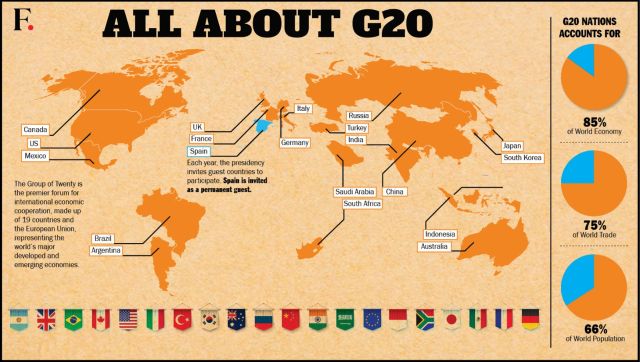
The G20 members represent 65 per cent of the world population, 79 per cent of world trade, a whopping 84 per cent of the world’s economy and are responsible for 79 per cent of global carbon emissions.
The idea behind the bloc is to bring together the most important industrialised and developing economies to discuss international economic and financial stability. For this, the leaders of G20 members meet yearly to discuss and formulate policies on issues of mutual interest.
How did the G20 come into being?
One could say that the formation of the G20 is forged in crisis. It came after the 1994 Mexican peso crisis and the 1999 Asian financial crisis. Canada’s then finance minister Paul Martin at a G7 meet realised that even though the meeting was meant to represent the most powerful economies in the world, crucial voices were missing.
“This doesn’t make any sense… China and India are not here, and in fact, the great economies regionally are not at the table. Don’t you think that we should be doing something about it,” he asked.
And from there, the idea of a G20 was born. Finally, in 1999, the G20 forum was formed after initiation by Martin and his American counterpart then-Treasury Secretary Larry Summers.
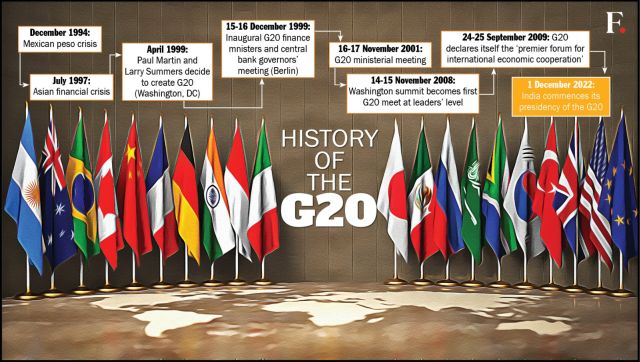
Once it was decided which countries would be a part of this bloc, the representatives met in Berlin, Germany, for the first annual meeting of the group. Heads of government/State started participating years later, in 2008. Interestingly, the United States showed reluctance to push the G20 to the leaders’ level. Speaking of it, Martin said, “President George W Bush was reluctant — he wasn’t against it, but he wasn’t for it.”
In 2009, G20 was designated the “premier forum for international economic cooperation”.
Over the next few years, the forum, as former South African president Thabo Mbeki put it, emerged “as a central player in the global financial architecture and an effective contributor to global economic and financial stability.”
How does the G20 work?
The G20 has no permanent leader and each year a country is decided to assume the presidency of the forum. The year 2023 sees India at the helm. The previous year saw Indonesia. The country with the presidency steers the G20 agenda and hosts the summit.
Also read: Why G20 presidency is important for India
However, it is supported by two other nations. One of the two nations must have had the presidency last year and the other nation is expected to assume the presidency the following year. This arrangement is called the Troika. Indonesia, India and Brazil are the Troika countries right now.
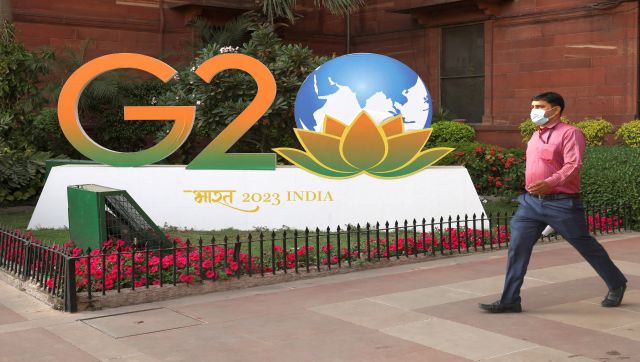
The agenda and work of the G20 are carried out through three distinct tracks – the Sherpa track, the finance track and the engagement groups.
The Sherpa track is led by emissaries of the respective member nations. The Sherpas directly report to the Heads of the States of their respective nations. The Sherpa Track is mostly concerned with non-financial discussions revolving around agriculture, anti-corruption, culture, development, education energy, trade, tourism, health, digital economy, etc.
The finance track is spearheaded by finance ministers and central bank governors of member states. They discuss and deliberate on issues such as international financial architecture, taxation, and finance and health.
The engagement group is led by non-government participants who contribute to policy-making and the G20 Leaders. It works with think tanks, civil societies, youth, businesses, women, labour, etc that contribute to the G20 Summit.
What are the achievements of G20?
Since its inception, the G20 has worked to encourage the formation of consensus on international issues. It played a key role in steering the world out of a global economic crisis in 2008-2010. Many experts credit the G20 with quick action.
Former Council on Foreign Relations (CFR) fellow Stewart Patrick said that the group “rescued a global financial system in free fall”. In 2008 and 2009, G20 nations agreed to spend $4 trillion to revive their economies, rejected trade barriers, and implemented far-reaching reforms to the financial system.
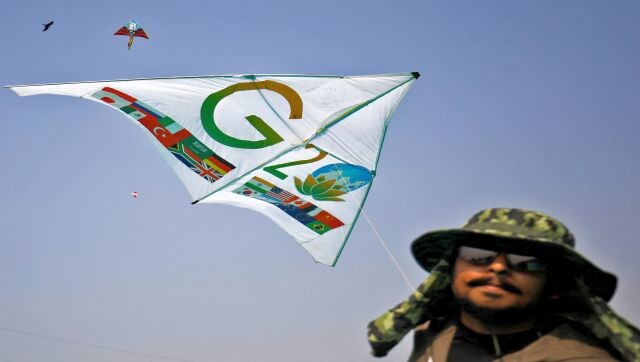
Since the economic crisis, the G20 has made commitments around issues that could be considered to fall under the “social agenda.” In 2014, in Brisbane, it pledged to reduce the gap between men and women in the workforce by 25 per cent by 2025.
In 2017, in Hamburg, the G20 launched the “Compact with Africa” initiative, which aims to promote and improve private sector development and investment. The same year, 19 members vowed to uphold their commitment to the Paris Agreement on climate change, despite the then-US president Donald Trump’s announcement that his country would be pulling out.
During the COVID-19 pandemic, the G20 undertook many measures to support economies and supply chains. It also lent its support to international organisations – the World Health Organization (WHO) and International Monetary Fund (IMF). In March 2020, G20 nations committed to pumping more than $5 trillion into the global economy and contributing to the WHO-led COVID-19 solidarity response fund. Moreover, the G20 countries agreed to ease the burden of debts by allowing the poorest countries to suspend repayment of official bilateral credit.
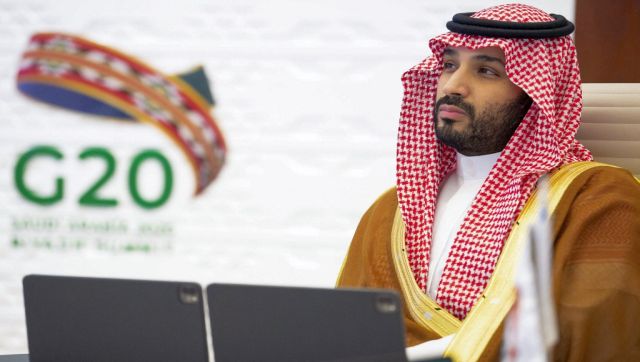
The issue of climate change has also been a focus of the G20. At the 2021 Rome summit, countries agreed to curb emissions of methane and end public financing for most new coal power plants overseas. In 2022, Indonesia, the host country, also agreed to close coal power plants in exchange for $20 billion in financing from high-income countries, including the United States.
As Canada’s prime minister Justin Trudeau said to the Centre for International Governance Innovation, a think tank, “The G20 has helped navigate the world through an economic crisis, and shown leadership on a number of shared challenges, from international development and climate change to displacement and migration”.
“No institution is perfect, but the summit has shown the international community can work to resolve common challenges, provide assistance to each other, and create a more inclusive vision of global leadership.”
With inputs from agencies
Read all the Latest News, Trending News, Cricket News, Bollywood News,
India News and Entertainment News here. Follow us on Facebook, Twitter and Instagram.
also read

Australian PM Anthony Albanese to attend G20 Leaders' Summit in New Delhi
Albanese will be among the leaders of G-20 nations who are scheduled to attend the summit under India’s presidency in New Delhi this September

India adopted unconventional approach to its G20 Presidency, says EAM Jaishankar
Stating that multiple challenges confront the G20 grouping, External Affairs Minister S Jaishankar said that India adopted an unconventional approach to its Presidency, making it much more connected with people

'India has zero tolerance policy against corruption': PM Modi in G20 Anti-Corruption Ministerial Meeting
The prime minister also mentioned the enactment of the Economic Offenders Act in 2018 under which the Indian government is aggressively pursuing economic offenders and informed about the recovery of assets worth over 1.8 billion dollars from economic offenders and fugitives


